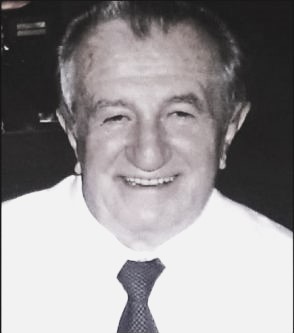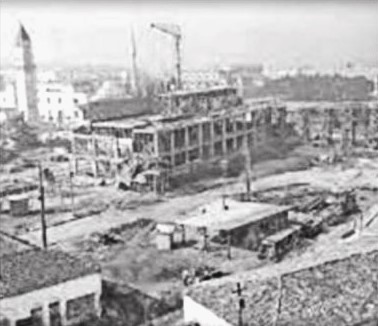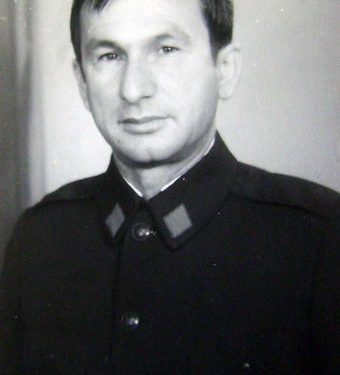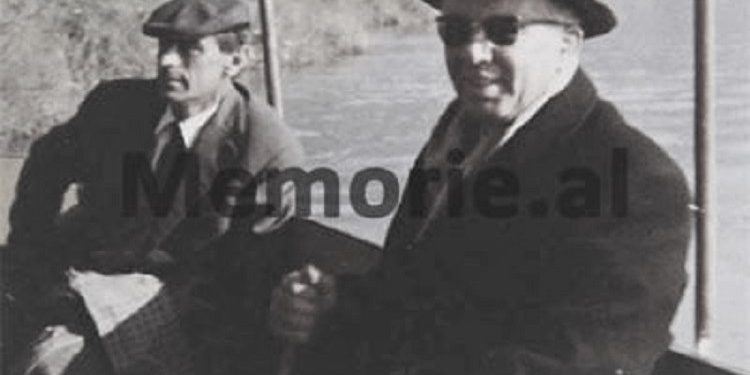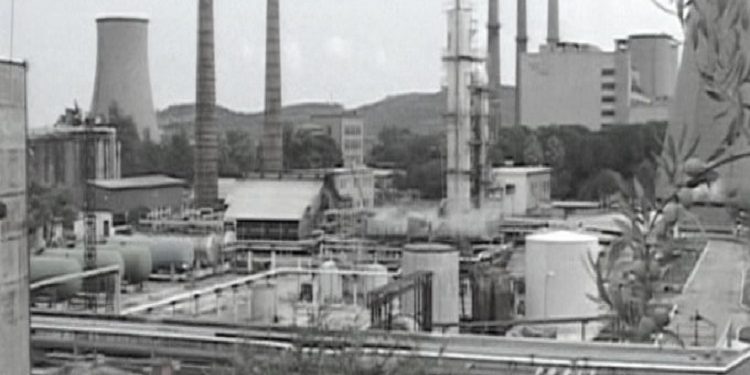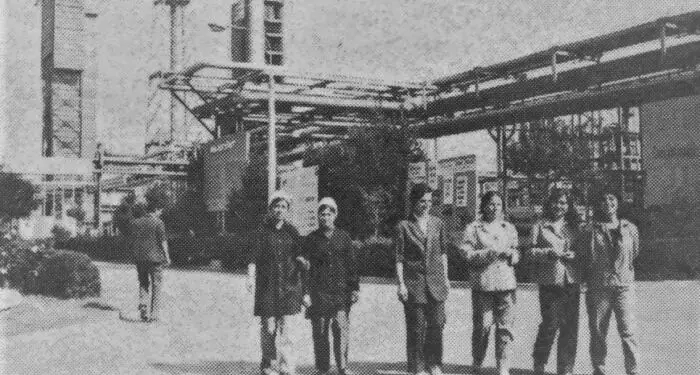By Manjola Bregasi
Muhamet Xhaferri: “I drank coffee with the investigator Pjetër Ndreca, who took my case, a week before the arrest, but it was correct, he did not torture me”
Memorie.al / Just a few months after the suicide of the former Albanian Prime Minister, Mehmet Shehu, in his hometown in Mallakastër, a campaign of punishment and terror would be launched. It was the time when the people of that area, very attached to the figure of Mehmet Shehu, had started the first whispers about the dilemma caused by his sudden death. And already used to the phenomenon of “betrayal” in the ranks of the party, but also its consequences, since the time of Koçi Xoxes, Enver Hoxha could not make a mistake this time. Punishing a few cadres in the area was the best way to make others keep their heads down.
On September 27, 1982, the Fier District Court would sentence the seven members of the so-called “Enemy Group of Ballsh” to prison, while their families would suffer exile. In an open trial, attended not only by residents of Mallakastra, but also of Berat and Vlora, the accused would be confronted with fabricated evidence and witnesses, in order to become “suffering for others”. But what was the charge and crime of the members of this group? How did their “hostile” activity come about and what was their true conviction, regarding Mehmet Shehu’s suicide. Muhamet Xhaferri, one of the convicts in this group, shows the staged scenario, to lower the heads of the people of Mallakastra.
Mr. Muhamet, you have been sentenced to eight years in prison, being described as a “member of Ballshi’s enemy group”, how does this story begin?
To describe all those events at that time is very difficult. After the murder of Mehmet Shehu, a red terror began in Mallakastër. It was the moment when people within the family were monitored by family members, e.g. the father was afraid of the son, the son was afraid of the father, the wife of the husband and the husband of the wife. It happened that within the family, people spoke in signs.
I have experienced this myself. The moment had come when elite in Mallakastër had to be hit, in order not to speak against the Labor Party and Enver Hoxha. At that time, I was the director of Culture in the United Cooperative, in the village of Dukas. I had come from Fratari and had done a good job there, with folk groups. I was at the height of my work. In January 1982, I recorded the first group on television, directed by Vera Grabocka and Merita Zyko. After this group appeared on RTSH, the persecution began.
The main aim was to hit key and influential cadres. In Mallakastër, good families were picketed, but also those who were in good state jobs. This started in January 1982 and continued until September, when we were arrested. During this time, the former insurance companies were employed, those who worked in the areas, and each of these people had the intention of using the words of others as arguments for the trial. So, what could you say to be punished? With three witnesses, at that time you were punished. And each of us, the members of Ballsh’s group, had three witnesses. It was planned to hit a group of seven people in Ballsh.
Where did this picketing come from and why did certain families have to be targeted?
This picketing was done by the communist dictatorship, by the nomenclature. Mallakastra had to take out a hostile group, so that all the people would keep their heads down and people would not speak what they thought, regarding the murder of Mehmet Shehu. Geography of the strike was even drawn up, more or less including all the villages in the area: I was from Çorushi, Musa Bega from Çorushi, Kastriot Shehu from Hekali, Hekuran Yzeiri (Qazimi) from Aranitasi, Selfo Pasha from Kremenari, Hasan Basha was from the area of Fier, Ferrik Hyseni was from Greshica. So the villages were picketed, but also their representative cadres. And this milestone was finalized on September 21, 1982.
How do you remember the moment of your arrest?
In 1982, after the public unmasking of Selfo Pasha in Ballsh, I was on the beach with a regular permit. On the second 15th day of the beach, I was called to the Party Committee in Fier. Zylyftar Ramizi, former secretary of the Fier Party Committee, was there and told me: “He openly told the Party. You agitated against the party and popular power. What did you say and what did you do”? “I don’t understand this”?! I told him. “Go think about it and you’ll come and show it to the party.” “But what have I said, what all the people of Mallakastra have said”, I replied. So in short, this was an investigation done by the party.
Did you actually say anything?
Normally, it was also a provincial election. This great figure, like Mehmet Shehu, in a period of not even a month, from a legendary hero, turns into a police agent. We could not be so easily convinced and we did not believe such a perverse action. Even at that time, a 12-page letter came out, explaining Mehmet Shehu’s activity as a police agent since the Spanish war. We moved through the villages of Mallakastra, to show you why Mehmeti was an enemy. I remember that in the village of Belishovë, an old man stood up and told us: “Send a letter of condolence to Mehmet Shehu”? So even I, like many intellectuals of that time, in such a situation, was not convinced. And this was the right moment to strike.
What happened after the remark that Zylyftar Ramizi made to you in Fier?
After my meeting in Fier with Zylyftari, I came to Ballsh. That night at 11:00 p.m., a meeting was held with the first secretary, Koli Xhaxha, who, among others, added: “I will put you in prison, all of you Malkastrians, because you defended Mehmet Shehu.” A few days later, I was also suspended from work, until September 21, 1982, when I was arrested.
Where were you arrested?
I was at home. It was 23:00 in the evening, and after having dinner, I was reading the newspaper “Drita”, while the children were sleeping. He knocked on the door. It was the powerful of the area, who lived next to us. Shpresa, my wife, opened the door for him: “Do you have any brandy at home, because some people have come to me”, he said. He had actually come to see if I was there. Just three minutes after our neighbor left, there was another knock on the door. This time, two policemen entered, the investigator and the Security operative. The investigator was Pjetër Ndreca, two policemen of the area, while Luftar Shehu, was a Sigurimi operative and maintained an extremely bad attitude.
At that moment they told me: “In the name of the people, you are under arrest.” I asked them to get dressed, because I was in my pajamas. The police escorted me and I went out. While the woman said only two words to me: “After all, it’s a prison for men.” When I went down the stairs, while “BÇ” was waiting downstairs, all the neighbors had come out of the windows. I remember being asked how I wanted my hands to be tied and after getting into the car, we headed towards Fier. The car stopped in front of the former Executive Committee, only 3 minutes. There, the Security operative contacted someone on the radio and said: “27 were taken”.
What about the other 6 people convicted with you, when were they detained?
From what I found out later, all the arrests were made within 1 hour, with the exception of Selfo Pasha, who was arrested a few months ago, and my father-in-law, Hekuran Yzeiri (Qazimi), who was arrested two days later. In the village of Armen, in Zborr, Musa Bega and Kastriot Shehu were arrested. At that time, Ferrik Hyseni was also arrested, while Hasan Basha, who came from Fieri and was arrested in the middle of the city, still not getting out of the car. On the way to the Internal Branch of Fier, Luftar Shehu told me: “Look, we will arrest two more from your family.”
How did the investigation proceed?
It is a scandal, or a madness to think, that for 4 days the investigator will hold a trial and sentence a so-called hostile group to 133 years in prison, exile and without the right to vote. This thing was a setup, showing that our dooms were predetermined.
Did you experience physical violence during the investigations?
If you entered the investigator, you will also have violence, but it was more about psychological violence than physical. At least, I speak for myself. I can also speak good words for my investigator, Pjeter Ndreca. Moreover, all of us who were cadres of that time were also familiar with the investigators. A week ago, I had coffee with the investigator who took my case.
What did the investigator seek to elicit through the questions and where were they focused?
The problem lay in the fact that we were called; “hostile group, for the overthrow of popular power”. We as a family had to be hit and for that, the motive had to be found. The reason was that we did not obey the word of the Party, that Mehmet Shehu had killed himself.
Where did the party learn this fact, who did you talk to?
The regime of that time had security, its own people, spies, Security collaborators who worked with us, drank coffee with us. I had a work colleague, a driver from my village and another work colleague, from the village of Drenovë, who also took the witness stand.
You said above that a group in Ballsh had to be hit; do you think that your selection was made by Tirana, or by the party in the district?
I would say that I can separate neither Tirana nor the district, because it was a state pyramid, which operated from the farthest (Enver Hoxha), down to the smallest cell. So such a system was built, that the article of agitation-propaganda was the most powerful article of that time. I cannot separate these two elements.
While we are talking about the punishment, we see that the cause is your suspicion, regarding the murder of Mehmet Shehu. Since you are from the same village as Mehmet and you were convicted for this very fact, did you have a personal acquaintance and relationship with him?
No. I had no personal acquaintance. My father had been at war with Mehmet, but I did not know him at all.
What about your relationships with others who were called part of the group?
I had Hekuran as my father-in-law and Musa as my cousin, but with the others, just friends.
Have you had political conversations with your father-in-law?
These were tricks and setups, to lower the heads of the Malaycastriots, so that it would not happen like in ’48-’49, with the attack of Koçi Xoxes. We haven’t talked about such issues, then all the Malkastrians suspected the murder of Mehmet, and I said it above, we were just an example, to soften the rebellion of the Malkastrians, after the sudden news about the suicide of Mehmet Shehu and the comments about with his betrayal.
How did things go after that?
The process of arrests ended on September 21, 1982. After 4 days of investigation, the moment of the trial came, which was the most terrible day? On September 27, 1982, at 7:30, we left with many reinforcements, from the Internal Branch of Fier. The trial was to be held in the cinema of Ballshi. It was open, by invitation. Cooperative leaders, office secretaries, council leaders, party members, representatives of mass organizations took part in the trial, because it had to be an exemplary trial. There were not only Malkastrians, but also from Vlora and Berati, that if someone spoke, he would be punished like us. The cinema held 680 people, 2-3 times more inside and 5 times more outside. The chairman of the court was Fehmi Abdiu.
Were there high representatives of the state in that session?
They were the deputies of the area, even placed in the first row.
What about the witnesses, what can you tell us?
The witnesses were all Allah-Shahis, as we call them. One of them was my friend. We were together at my house in Çorrush and on the way, returning to Ballsh, political conversations started in the car. “Why do you need these conversations”, I said. But this friend took my words to Shkëlzen Bajraktari, chief investigator in Fier. And the other witness, who was a cultural employee, his name was Agur, came to dinner at my house, brought in by Rako Kola, an operator of the Plant’s Security. In the middle of the night, he went and after taking a photo of Enver with Mehmet, which I had not thrown away, and a book of Mehmet’s, from my library, he left.
This fact came out to me as an argument in the trial. I was even impressed that after the witnesses, my son’s teacher, who was in first grade at that time, also appeared there. Although friends with my wife, she came and declared that; my son did not recite poems for Enver Hoxha, but he asked for poems for uncle Mehmet. Which, once again, proves that we are dealing with a montage, because there were no poems about Mehmet Shehu and a 6-year-old child, there was no way to tell the difference?
“The sentencing of the Mallakastra group, in September 1982”
The punishment of the Malkastrians, immediately after the suicide of Mehmet Shehu, is already known. The communist head of the state and his watchful eye, guarding against a rebellion of the inhabitants of the former prime minister’s hometown, made a spectacular blow, with public trials, to “denounce the hostile activity”, as a reflection of the activity of the “poli-agent” Mehmet Shehu.
In September 1982, in the center of the city of Ballshit, in a public trial, seven of the residents of the area, who until that time performed various functions in the local administration, were to be sentenced with great fanfare.
At the head of this group, it would be the former comrade of the war years and the invalid of the 1st Assault Brigade, Hekuran Yzeiri (Qazimi), who was among the first to express his doubts about Prime Minister Shehu’s act of suicide. Meanwhile, Selfo Pasha, Kastriot Shehu, Ferrik Hyseni, Hasan Basha, Musa Bega and Muhamet Xhaferri would also be punished.
The letter to Mehmet would cost him 10 years in prison
At the eighth congress of the ALP, just a short time before Mehmet Shehu killed himself, one of his old friends from Mallakastra, a war comrade with him, while watching him on television, noticed his sad appearance and pale face his. Pushed by this fact, Hekuran Yzeiri (Qazimi), a man with a position in the Mallakastra area, wrote a letter to the Albanian Prime Minister, in which he asked him about the concern he reflected during the congress proceedings: “Why didn’t I see you well in the congress? What happened? You paled out”?!
But this letter, just a few months later, when Mehmet Shehu committed suicide, would be the reason to crucify the prime minister’s old friend, who had apparently foreseen his bad fate. More than that, for Hekuran Yzeir, it would be torturous, especially the “unmasking”, five hours before the city of Ballshit. And what’s more, his condition was made difficult by the fact that he had to stand on one leg, because he had lost the other leg in the war.
Envoy Kadri Hazbiu to Ballsh, to quell the revolt
While Enver Hoxha had received the first information about the expression of doubts by many of the residents of Mallakastra, regarding the act of suicide of Mehmet Shehu, he took one of his most trusted people and one of the most popular figures in the Mallakastra area, the former Minister of the Interior, Kadri Hazbiu.
As the ex-convicts, who were participants in that meeting, remember, he felt cramped and sometimes, even he did not know how to answer, many of the questions of the ordinary people of Mallakastra, which apparently, he did not they had missed the news of politics, about the betrayal of their fellow countryman.
And yet, Kadri Hazbi had no choice but to quote his standard expression, calling on the Malkastrians to remain loyal to Enver Hoxha and the Labor Party. Ironically, just a few days after this meeting, Kadri Hazbiu would appear as a “traitor to the party and the people” and would be crucified in the guillotine of the communist monster. Memorie.al




